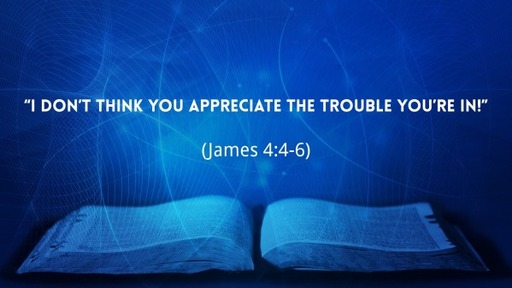"I don't think you appreciate the trouble you're in!"

Notes
Transcript
Scripture Reading:
Introduction: Appreciate the good and the bad.
Introduction: Appreciate the good and the bad.
To appreciate the good, you must appreciate the bad.
What do you think I mean by that?
The more significant to bad seems, the more desirable the good will be.
James wants his readers to appreciate the good and the bad of the trouble they’re in.
Because of there behaviour toward one another they have placed themselves in a very bad position.
But the good news is that there is a place to go from there.
Transition: Context & Outline
Transition: Context & Outline
This fits into a reoccurring theme: Practicality of Religion in Relationships
James 1:27
James 2:1
James 2:8
James 2:15–16
James 3:9
James 3:16
Section Outline:
Relationship with People (vv. 1-2a) - BOOKEND
Relationship with God (vv. 2b-10) - CORE
Relationship with People (vv. 11-12) - BOOKEND
James starts with...
The cause for ...
Conflict with People (vv. 1-2a)
Disappointment in Prayer (vv. 2b-3)
James continues here with...
Rebuke (vv. 4-5)
Stated
Supported
Reminder (v. 6)
Stated
Supported
Rebuke (vv. 4-5)
Rebuke (vv. 4-5)
To criticize sharply, to express sharp, stern disapproval of, to reprimand
For what?
Rebuke Stated (v. 4)
Rebuke Stated (v. 4)
These are harsh words in comparison to his typical reference to his readers as “brothers.”
Why does James call them adulterers?
Why does James call them adulterers?
That’s how serious it is.
That’s what they are doing.
Adulterer - one who turns from a covenant relationship
From God to what?
World - anti-God system (1 John 2:16)
For all that is in the world—the desires of the flesh and the desires of the eyes and pride of life—is not from the Father but is from the world.
Friendship - pursued relationship
Enmity - rejected relationship
How have they committed adultery?
How have they committed adultery?
The implication is that their passions (vv. 1, 3) are being influenced by their relationship with worldliness...
Which is contrary to there relationship with God...
Which is destructive to the relationship with one another.
The other implications here is that this can and should be reversed.
It is not choosing what NOT TO pursue, but choosing what TO pursue.
Thankfully, God’s covenant it not dependent on us.
Rebuke Supported (v. 5)
Rebuke Supported (v. 5)
Scripture says - Scriptural Concept (Exodus 20:5; Exodus 34:14)
You shall not bow down to them or serve them, for I the Lord your God am a jealous God, visiting the iniquity of the fathers on the children to the third and the fourth generation of those who hate me,
(for you shall worship no other god, for the Lord, whose name is Jealous, is a jealous God),
By “spirit” he either means...
The Holy Spirit
In other words, this is what motivates God to indwell believers.
The human spirit
soul or heart, immaterial, the real you
What does it mean that God is jealous?
What does it mean that God is jealous?
We think of jealousy as a bad thing, but...
Is marital jealousy a bad thing?
Is it wrong for a spouse to desire and even expect a unique love in return?
He desires that His people love Him with a unique love unlike anyone or anything else.
A commited love, an obedient love.
An exclusive love, a supreme love.
Why is God jealous for His people?
Why is God jealous for His people?
Because He first loved us.
Because He alone deserve that honor and glory.
Because that is our ultimate purpose, and therefore, satisfaction.
Reminder (v. 6)
Reminder (v. 6)
The good news that should be deeply appreciated because of the previous rebuke
Of what?
Reminder Stated
Reminder Stated
Grace is the other side of what James has said here so far.
What is grace?
What is grace?
Unmerited favor.
God’s love to the unlovable.
What is MORE grace?
What is MORE grace?
More than the world can offer.
More than our sin - adultery.
Reminder Supported
Reminder Supported
May be a quote, or a summary that sounds more like a quote (Proverbs 3:34; Proverbs 29:23).
Toward the scorners he is scornful, but to the humble he gives favor.
One’s pride will bring him low, but he who is lowly in spirit will obtain honor.
What does it mean to be humble?
What does it mean to be humble?
Correct view of self due to a correct view of God.
In context, acceptance of what James is saying about them.
Application: Humble yourself.
Application: Humble yourself.
This will be the result of what comes next (v. 10).
Benediction: